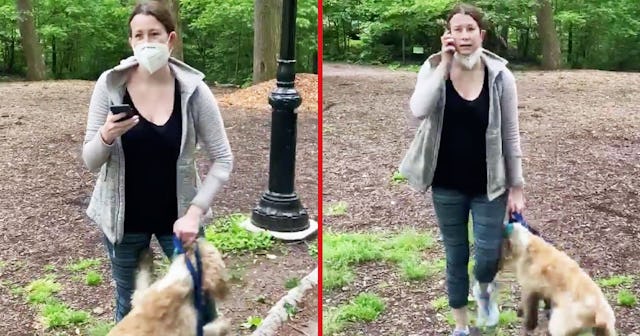White Woman Calls Police On Black Man After He Asks Her To Leash Her Dog

A white woman who refused to leash her dog in Central Park called the police on a black man asking her to do so
In yet another incident of a white person calling the police on a black person for absolutely no reason at all, New Yorker Amy Cooper has gone viral for how she handled a situation in which a black man (rightfully) asked her to leash her dog in Central Park’s Ramble, a semi-wild part of the famed park.
Christian Cooper (the two are unrelated) posted a video on his Facebook page detailing the encounter between himself and Ms. Cooper. He writes, “Central Park this morning: This woman’s dog is tearing through the plantings in the Ramble.” He explains that he pointed out to her that dogs need to be leashed in the Ramble, even showing her a nearby sign. He says that she replied, “The dog runs are closed. He needs his exercise.” Mr. Cooper told her there was a section outside the Ramble where he could run off-leash, but she called it “dangerous.” That’s when things took a turn.
Mr. Cooper, an avid birder according to his sister, who shared the video on her Twitter account, told her, “Look, if you’re going to do what you want, I’m going to do what I want, but you’re not going to like it.” He then took out dog treats that he says he keeps on him for incidents like this. “I didn’t even get a chance to toss any treats to the pooch before Karen scrambled to grab the dog,” he recounts. That’s when Mr. Cooper began recording and, he says, “her inner Karen fully emerged and took a dark turn…”
Ms. Cooper asks that Mr. Cooper stop recording her and gets closer to him, a clear violation of social distancing amid the coronavirus pandemic. Sounding alarmed, he says, “Please don’t come close to me.” She then threatens to take his picture and call the cops. “Please call the cops,” he says. She begins to dial saying, “I’m going to tell them there’s an African-American man threatening my life.” She tells the operator that Mr. Cooper is “recording me and threatening me and my dog,” repeatedly stating that he’s “African American,” her voice growing more and more hysterical.
As the video was shared thousands of times, Ms. Cooper’s identity quickly came to light. Her employer, Franklin Templeton, has placed her on administrative leave as of last night. “We take these matters very seriously, and we do not condone racism of any kind,” they write. “While we are in the process of investigating the situation, the employee involved has been put on administrative leave.”
As the encounter went viral, a number of concerned commenters also worried about Ms. Cooper’s dog, who she is seen jerking around by the collar as she grows more upset with Mr. Cooper. The rescue she adopted him from posted on their Facebook page that the animal was voluntarily surrendered by Ms. Cooper last night, May 25th. “Our mission remains the health and safety of our rescued dogs. The dog is now in our rescue’s care and he is safe and in good health,” they write.
Let it be said that the internet outrage for her treatment of the dog is not at the same levels for how she treated Mr. Cooper, whose life she put in danger by calling the police and saying that he was threatening her when he was not. The number of comments including concern for the dog with no mention of the man in possible danger are completely absurd. The way she handled the dog is abhorrent but it’s her disregard for Mr. Cooper’s safety that deserves the most public ire.
Story after story after story of police encounters with black people ending in violence and death have hit the news in recent years. It would be hard to believe if Ms. Cooper claimed she didn’t realize the dangers of her reporting Mr. Cooper to police for no reason at all, possibly escalating the situation and putting an innocent man in harm’s way.
Ms. Cooper has since issued an apology to a local NBC News affiliate. Mr. Cooper says he would accept it “only if it is genuine and if she plans on keeping her dog on a leash going forward.”
This article was originally published on